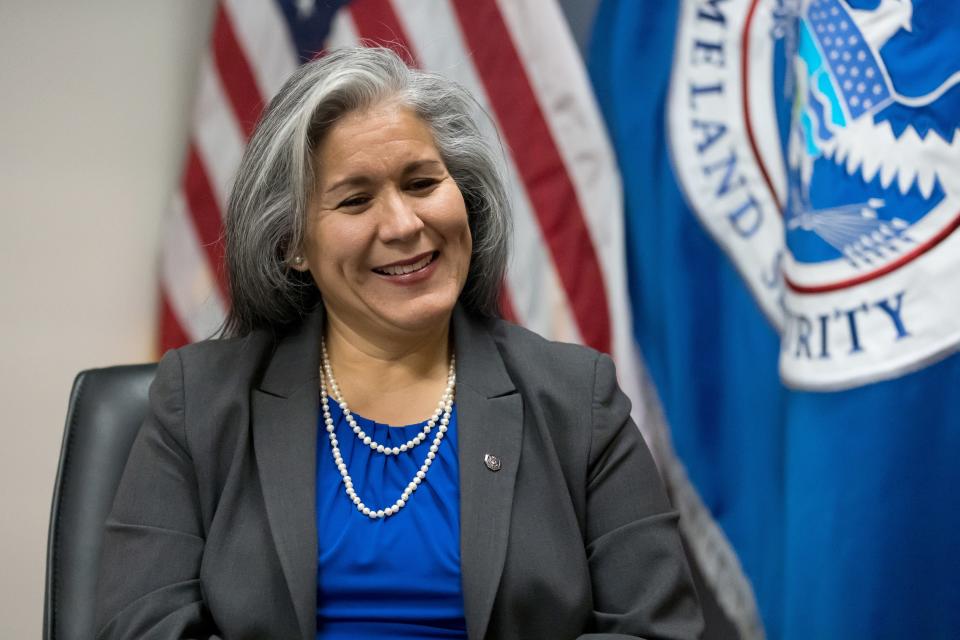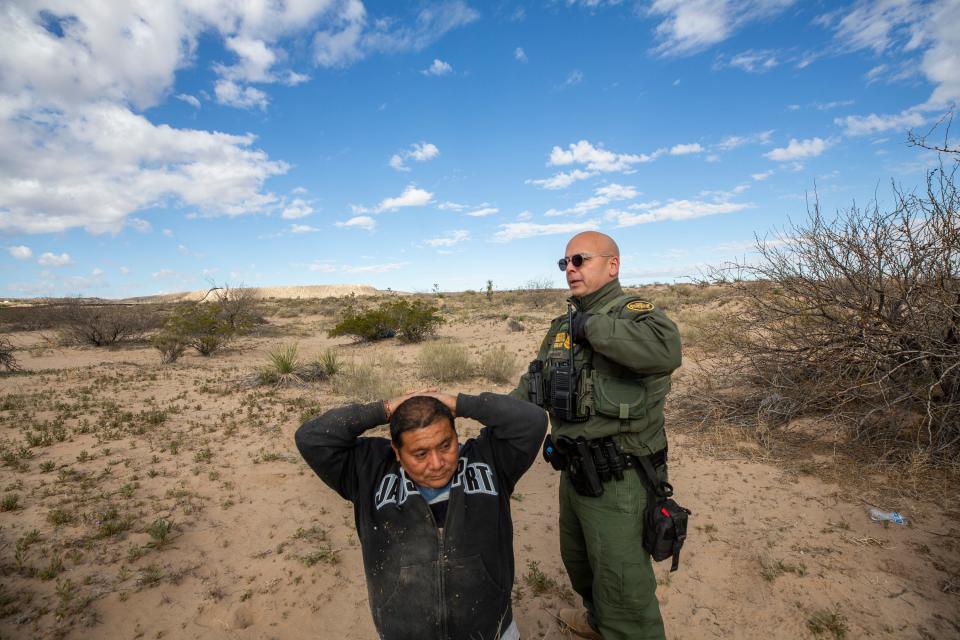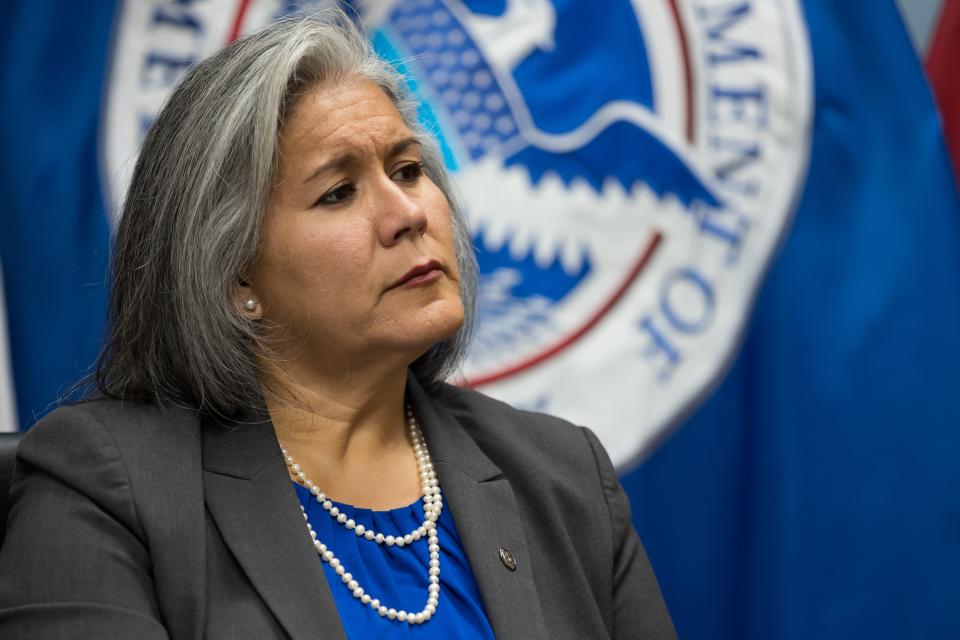Q&A: ICE Field Office Director Mary De Anda-Ybarra talks deportation after Title 42
When U.S. Immigration and Customs Enforcement named Mary De Anda-Ybarra director of its El Paso Field Office last month, she became the first woman and only the second El Pasoan to hold the region's top post in immigration law enforcement.
De Anda-Ybarra now runs Enforcement and Removal Operations ‒ the branch of ICE that handles detention and deportation ‒ for an area covering 51 counties in West Texas and New Mexico. She took over as the region prepared for the end of Title 42.
That pandemic-era policy allowed the Border Patrol to quickly expel migrants, including those seeking asylum, and reduced the number of people that may have otherwise landed in immigration detention. Title 42 restrictions ended Thursday night, and De Anda-Ybarra said ICE will ramp up use of its four detention centers in the region.
De Anda-Ybarra, a graduate of the University of Texas at El Paso, began her career with the federal government in 1996 as an immigration inspector in El Paso with the Immigration and Naturalization Service, the precursor agency to what later became the Department of Homeland Security. She worked at El Paso-area ICE detention centers and recently served as acting field office director in Dallas for Enforcement and Removal Operations.
De Anda-Ybarra spoke to the El Paso Times about what's to come with the end of Title 42 restrictions and how she envisions the future of immigration enforcement in the region.
After this interview, U.S. Customs and Border Protection said ICE agents assisted with a "targeted enforcement operation" in Downtown El Paso to apprehend and process undocumented migrants in the area.

Q: I'd like to start with the state of the field office. You've got four detention centers. Are they full?
A: Our occupancy because of our pandemic response is not at full capacity. However, we are expecting that with the end of Title 42 those requirements are going to change, and we do anticipate going to closer to 100% capacity.
Our El Paso Processing Center can hold up to 840 individuals. Our Otero County Processing Center has capacity for 1,000 individuals. Our Cibola detention center is at about 150. Our Torrance detention facility can hold 505. We're not at those levels at this time, but we are expecting to be able to assist with any requests from CBP, Border Patrol or the Office of Field Operations, and we’ll be taking into custody those individuals that need to be detained.
Nationwide, we are also providing bed space at other field offices. New Orleans has a lot of beds. So, there will be transfer flights to other facilities as needed.

Q: The Department of Homeland Security Secretary Alejandro Mayorkas has said the agency is going back to enforcing Title 8, which includes both asylum provisions and enforcement and removal. How do you envision the return to Title 8 in this field office?
A: I will tell you that Title 8 has not ever ended for this field office. We do not do expulsions. We do not deal with Title 42. Everyone who we detain is under some form of processing that happened for Title 8, whether it's expedited removal with or without an asylum claim.
We are still monitoring the jails ‒ the local jails, the federal jails ‒ and taking into custody people who have violated the immigration laws and who are criminals. Our deportations continue. Our air charter operations or ICE removal flights are functioning daily, as well. We also conduct commercial removals. For those countries that do not accept our charter flights, we are still removing individuals through commercial means.
More: When Title 42 expires, will migrants be prosecuted for crossing border illegally?
Q: So, you do envision the field office leaning on detention in a way that we maybe haven't seen in the past couple of years? Border Patrol’s El Paso Sector has seen an uptick in illegal crossings, and there are hundreds of people who haven’t been processed by border agents gathered in Downtown. What role do you see ICE playing in detaining undocumented people in that area?
A: For the individuals that you're referring to Downtown … ultimately, ICE would be handling those cases if, and only if, they end up arrested.
Under Enforcement and Removal Operations, we monitor individuals who are arrested and in our state, local and federal jails. If the El Paso Police Department were to arrest somebody, then our criminal alien program deportation officers would be monitoring that, would conduct interviews and then determine whether or not we are going to take them into custody.
Q: I’ve been in the field before where I've seen ICE arrest people who are undocumented for being undocumented. So, is that posture a matter of guidance from Washington, D.C., right now?
A: ERO (ICE Enforcement and Removal Operations) conducts fugitive operations. So, we are targeting certain individuals and we will make those arrests.
When we're looking at larger groups being arrested, those ICE operations are really more HSI, the Homeland Security Investigations. ERO has always been more target-driven. We are looking for specific individuals who are usually fugitives, you know, in one form or fashion, or criminals who, again, maybe were released from a jail and were not turned over to us. But again, those are targeted arrests. We don't do mass arrests. Sweeps or going close to the church ‒ you know, it is a sensitive area ‒ that is just not something that we normally do.

Q: Could you tell me more about the commercial deportation flights?
A: For example, we're going to remove someone to China. Then that means that we need to go through our removals division in headquarters. With their assistance, we obtain a travel document. Once the government of China issues the travel document, which indicates that they are accepting that person for removal, we make arrangements with a contractor. The arrangements are made not only for the individual, but for officers who are going to escort the individual depending on the criminality of the person. We may just escort them to their last U.S. destination before they get to their country; or if they are felons, or we think they're very high risk, the officers would be traveling all the way to their country of origin.
Q: Are Venezuela, Cuba, Nicaragua or Haiti currently on the short list of countries you do this with?
A: Cuba is currently taking some charter flights. Nicaragua is taking some charter flights; if we fill up those charter flights, we can remove commercially. Venezuela has been the one that's, you know, a bit of a problem. So, our HQ Removals division is working really, really hard in establishing those international agreements to be able to do so.
Q: What are the ICE El Paso Field Office’s biggest challenges?
A: Our biggest challenge is the support. We are shorthanded, like many people. We are a small agency. We do not have sufficient detention space for the things that we need to do. We don't have enough officers to handle all the work we need to do because, again, we are not just taking in the individuals who are crossing illegally; we are also responsible for our nondetained cases.
All of the individuals (Border Patrol) processed for "Notice to Report," all the people that they processed as parole-plus cases, all of those cases are being processed now by ERO personnel. When we look at the numbers that we're expected to detain, the numbers that we are expected to process for those nondetained cases … we need equipment; we need personnel; we need better facilities.
Q: What is the El Paso Field Office relationship with Texas Gov. Greg Abbott's Operation Lone Star? Are you working closely with the state Department of Public Safety on border issues?
A: No, that is really not our lane. That is a state decision. That is not a federal operation.
Q: You did mention earlier that if local law enforcement were to arrest people for whatever reason, and a person is found to be unlawfully in the country, ICE gets involved at that point. What happens next?
A: The next step would be that ICE would possibly get involved, because, again, under our criminal alien program, our officers are monitoring who is getting arrested and who may be in the country unlawfully. At that time, they will conduct the required checks and make the determination as to whether or not ICE is going to process them under Title 8 and detain them, or process them under Title 8 and release them on an order of recognizance. It's on a case-by-case basis.
Q: El Paso has always been a welcoming community to migrants and immigrants. It does feel like there are some growing tensions. What do you think is needed to address the current pattern of migration?
A: It's unfortunate that immigration ‒ whether it be CBP, HSI, ICE, ERO ‒ it's a very political topic.
I think it's simple: We have the Immigration and Nationality Act, and, as a sworn officer, it’s my duty to protect and serve. I do not have the answers. I do not take political sides. I just want to make sure that we're doing our job well, that we're treating everyone we encounter, criminal or otherwise, with dignity and respect. We're just hoping that we're given the support that we need from the executive branch, and from the congressional branch, to allow us to do that.
Lauren Villagran can be reached at lvillagran@elpasotimes.com, on Twitter @laurenvillagran or on Instagram @fronteravillagran.
This article originally appeared on El Paso Times: Mary De Anda-Ybarra talks ICE detention, deportation after Title 42

